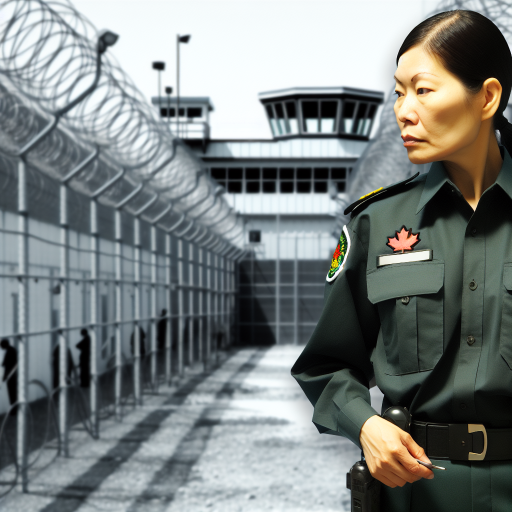Understanding the Nature of Stress in Correctional Environments
The Correctional Environment
Correctional officers face unique challenges daily.
The nature of their work can create high levels of stress.
They operate in a complex and often dangerous environment.
Furthermore, close interactions with inmates can increase tension.
Understanding this environment is crucial for stress management.
Sources of Stress
Several factors contribute to stress levels among correctional officers.
First, the threat of violence can weigh heavily on their minds.
Moreover, officer workloads often exceed manageable limits.
This can lead to physical and emotional burnout over time.
Additionally, dealing with offenders’ unpredictable behaviors adds complexity.
Impact of Stress
The consequences of chronic stress are profound.
High stress levels affect both mental and physical health.
Officers may experience anxiety, depression, or emotional exhaustion.
Furthermore, it can impair decision-making abilities during critical moments.
Consequently, stress can negatively affect overall job performance.
Resilience Factors
Ultimately, resilience can mitigate some of the stress effects.
Supportive workplace relationships play a significant role.
Effective communication among colleagues fosters a sense of community.
Moreover, access to mental health resources is vital for officers.
Training in stress management techniques can enhance resilience.
The Impact of Stress on Correctional Officers’ Mental Health
Understanding Stress in the Correctional Environment
Correctional officers face unique stressors daily.
High-pressure situations can lead to significant emotional strain.
Frequent interactions with inmates create a challenging work atmosphere.
Moreover, the unpredictable nature of the job adds to this stress.
Consequences of Chronic Stress
Chronic stress negatively impacts mental health.
Unlock Your Career Potential
Visualize a clear path to success with our tailored Career Consulting service. Personalized insights in just 1-3 days.
Get StartedIt can lead to anxiety and depression in affected officers.
Sleep disturbances are also common among stressed personnel.
Furthermore, it may result in burnout over time.
Signs of Stress in Correctional Officers
Correctional officers exhibit various signs of stress.
Physical symptoms like headaches and fatigue may arise.
Emotional indicators include irritability and mood swings.
Additionally, withdrawal from colleagues can signal deeper issues.
The Importance of Mental Health Support
Mental health support is crucial for correctional officers.
Access to counseling can mitigate the effects of stress.
Workshops on stress management foster a supportive environment.
Encouraging peer support becomes vital in addressing mental health challenges.
Strategies for Managing Stress
Effective stress management strategies benefit correctional officers.
Regular physical activity boosts mood and improves resilience.
Mindfulness practices, such as meditation, enhance emotional well-being.
Additionally, engaging in hobbies outside work fosters relaxation.
Creating a Supportive Work Environment
A supportive work environment alleviates stress among officers.
Open communication with supervisors promotes trust and understanding.
Team-building activities strengthen camaraderie and reduce isolation.
Moreover, flexible scheduling can help officers manage personal responsibilities.
Recognizing Symptoms of Stress and Burnout in Correctional Staff
Understanding Stress Symptoms
Correctional officers often face intense pressure in their roles.
Recognizing the symptoms of stress is crucial for maintaining mental health.
Common signs include irritability and emotional exhaustion.
Additionally, physical symptoms such as headaches may occur.
Officers might also experience changes in sleep patterns.
Feeling overwhelmed is a significant indicator of stress.
Ultimately, acknowledging these symptoms is the first step toward recovery.
Identifying Burnout
Burnout occurs after prolonged exposure to stress in the workplace.
It’s essential to distinguish burnout from general stress symptoms.
Each officer may experience unique symptoms of burnout.
Common indicators include cynicism and detachment from work.
Moreover, reduced performance and motivation are prevalent signs.
Officers may also find themselves disengaged from colleagues.
Addressing burnout promptly can prevent long-term health issues.
Impact of Stress on Mental Health
Stress significantly affects an officer’s mental well-being.
It can lead to anxiety and depression if left unaddressed.
Practical support is crucial in resolving stress-related challenges.
Seeking professional help may provide necessary relief.
Building a supportive work environment fosters resilience.
Engaging in open conversations about stress is beneficial.
Ultimately, proactive measures can enhance mental health outcomes.
Importance of Support Systems
A strong support system is vital for correctional staff.
Peer support enhances resilience against stress.
Additionally, mentorship programs can guide officers in coping strategies.
Workshops on stress management can provide valuable skills.
Employers should encourage participation in wellness programs.
Creating safe spaces for sharing experiences promotes healing.
Ultimately, support systems can significantly mitigate stress effects.
Learn More: Day in the Life of a Canadian Environmental Officer
Effective Coping Strategies for Stress Management
Understanding the Sources of Stress
Correctional officers often face unique stressors daily.
Understanding these can help in developing coping strategies.
Common stressors include high-stress environments and dangerous situations.
Additionally, exposure to trauma can lead to emotional fatigue.
Identifying these sources is the first step toward managing stress.
Developing Healthy Habits
Healthy habits play a crucial role in stress management.
Exercising regularly can significantly reduce stress levels.
Consider engaging in physical activities like running or yoga.
Moreover, maintaining a balanced diet is essential for overall well-being.
Eating nutritious meals can help improve mood and energy levels.
Practicing Mindfulness
Mindfulness techniques can also help combat stress effectively.
Practicing meditation encourages relaxation and mental clarity.
Try setting aside a few minutes daily for breathing exercises.
Additionally, spending time in nature can provide a calming effect.
Connecting with the outdoors reduces stress and enhances mood.
Leveraging Social Support
Building a strong social network is vital for correctional officers.
Support from family and friends can alleviate feelings of isolation.
Participating in peer support groups offers an excellent outlet for sharing experiences.
Furthermore, communicating with trusted colleagues fosters a sense of belonging.
These connections can provide emotional support during tough times.
Utilizing Professional Resources
Seeking professional help is a proactive approach to managing stress.
Consider engaging with counselors or therapists specializing in trauma.
Additionally, attending workshops can educate officers on coping strategies.
Utilizing employee assistance programs can provide valuable resources.
These resources can help individuals navigate their mental health effectively.
Discover More: Career Growth Opportunities in Border Services
The Role of Peer Support and Teamwork in Reducing Stress
The Importance of Peer Support
Peer support plays a vital role in managing stress for correctional officers.
Having a support system reduces feelings of isolation in challenging environments.
When peers share experiences, it fosters understanding and empathy.
This connection can provide a sense of belonging, which is essential.
Furthermore, the encouragement from colleagues can improve morale.
Group discussions often reveal common stressors, facilitating problem-solving.
Peer support networks can also offer resources for mental health services.
Fostering Teamwork
Teamwork is crucial in creating a positive workplace culture.
Effective collaboration reduces individual stress levels significantly.
When team members work towards a common goal, they strengthen bonds.
This unity enhances communication, leading to fewer misunderstandings.
Each officer feels more capable when supported by teammates.
Moreover, shared responsibilities decrease the burden on individuals.
Team-building activities can further promote trust among officers.
Strategies for Implementing Peer Support
Correctional facilities can implement structured peer support programs.
Training programs can prepare officers to provide meaningful support.
Regular feedback sessions can help improve these initiatives.
Moreover, designing safe spaces for discussions encourages openness.
Officers should feel free to express their feelings without judgment.
Finally, leadership must actively promote these peer support systems.
Encouraging Open Communication
Communication is key to effective peer support and teamwork.
Encouraging dialogue helps identify stressors early on.
Regular check-ins among team members can strengthen relationships.
Officers should feel comfortable discussing their challenges openly.
Moreover, confidential channels must be available for sensitive topics.
Ultimately, open communication fosters a supportive environment.
The Impact on Employee Well-Being
All these strategies contribute to overall employee well-being.
Reduction in stress leads to improved job satisfaction among officers.
Consequently, this results in better performance and lower turnover rates.
A supportive workplace ultimately benefits everyone involved.
Thus, promoting peer support and teamwork must remain a priority.
Uncover the Details: Preparing for a Correctional Officer Interview in Canada

Implementing Mindfulness and Relaxation Techniques
The Importance of Mindfulness
Mindfulness helps correctional officers manage stress effectively.
Practicing mindfulness enhances focus and emotional resilience.
It fosters a sense of calm amid daily challenges.
Moreover, it improves overall mental well-being.
Techniques for Mindfulness
Begin with deep breathing exercises.
For example, inhale deeply through your nose.
Then, exhale slowly through your mouth.
Repeat this process several times to center yourself.
Try guided meditation sessions using apps or online resources.
Incorporating Relaxation Techniques
Progressive muscle relaxation is a beneficial method.
Tense and then relax each muscle group in sequence.
This helps release built-up tension throughout the body.
Additionally, consider yoga and stretching routines.
These can improve flexibility and reduce physical tension.
Creating a Mindful Environment
Establish a quiet space for practice.
Use calming scents like lavender or chamomile.
Dim the lights to create a soothing atmosphere.
Incorporate nature sounds to enhance relaxation.
Building a Routine
Consistency aids in cultivating mindfulness.
Allocate specific times for mindfulness practices daily.
Start with just a few minutes each day.
Gradually increase the duration as you progress.
Seeking Support
Involve colleagues in mindfulness activities.
Group sessions encourage accountability and camaraderie.
Additionally, consider professional mindfulness programs.
These can provide structure and expert guidance.
See Related Content: Physical and Mental Requirements for Border Services Work
Resources and Support Systems for Correctional Officers in Canada
Professional Development Opportunities
Many organizations offer training programs for correctional officers.
These programs enhance skills and knowledge in various areas.
Participants can attend workshops that focus on stress management techniques.
Additionally, online courses are available for flexible learning options.
Peer Support Networks
Peer support networks play a vital role in stress management.
Correctional officers can connect with colleagues to share experiences.
The networks foster a sense of community and understanding.
These connections provide emotional support during challenging times.
Access to Mental Health Services
Mental health services are crucial for correctional officers.
Many facilities provide access to counselors and psychologists.
These professionals can help officers cope with job-related stress.
Furthermore, support lines are available for confidential assistance.
Wellness Programs
Wellness programs promote physical and mental well-being.
Many institutions offer fitness classes and health workshops.
These programs encourage activities that reduce stress effectively.
Engaging in such activities fosters camaraderie among officers.
Resource Centers
Resource centers provide educational materials to correctional officers.
These materials focus on mental health and stress management tips.
Officers can access brochures, videos, and online resources.
Such resources help officers better understand stress and coping strategies.
Family Support Services
Family support services can also alleviate stress for correctional officers.
Programs designed for families ensure they understand the profession.
Workshops educate families on dealing with the unique challenges.
These services strengthen overall family dynamics and support systems.
Training Programs Focused on Stress Management Skills
Importance of Tailored Training
Training programs should address the unique stressors faced by correctional officers.
Customized programs enhance understanding of stress management techniques.
Moreover, they foster a supportive environment among peers.
Core Components of Effective Programs
Effective training programs must include practical techniques for stress reduction.
They should cover time management, mindfulness, and relaxation strategies.
Additionally, programs need to incorporate physical fitness components.
Mindfulness Techniques
Mindfulness practices promote focus and reduce anxiety.
Officers can benefit from meditation and breathing exercises.
Regular practice enhances emotional resilience in high-pressure situations.
Physical Fitness and Stress Reduction
Physical fitness significantly impacts mental well-being.
Exercise releases endorphins, which improve mood and decrease stress.
Training programs should encourage regular physical activity among officers.
Incorporating Peer Support
Peer support is vital in managing stress levels among correctional officers.
Facilitated group discussions can foster trust and openness.
Furthermore, sharing experiences helps mitigate feelings of isolation.
Feedback and Continuous Improvement
Training programs should include feedback mechanisms for continual enhancement.
Surveys can gauge the effectiveness of stress management strategies.
Additionally, ongoing adjustments ensure programs remain relevant and effective.
Additional Resources
CCWORK protocol: a longitudinal study of Canadian Correctional …
Sleep quality and mental disorder symptoms among correctional …




